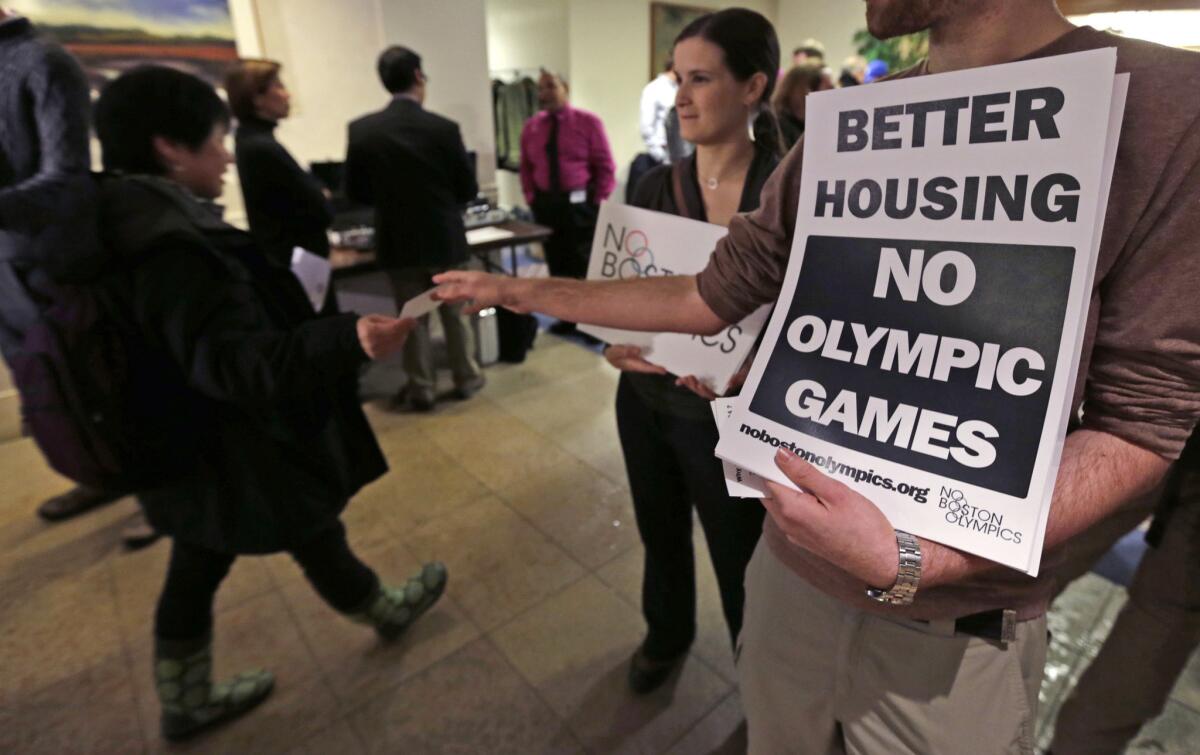L.A., if chosen, could feel effects of failed Boston 2024 Olympics bid

Jonathan Cohn and Claire Blechman hand out fliers prior to the first public forum regarding the Boston 2024 Olympic bid on Feb. 2.
- Share via
Talk circulated around the International Olympic Committee all spring and summer, with members returning to the same question:
When will the Americans drop Boston’s floundering campaign to host the 2024 Summer Games?
The answer came early this week by way of a statement from Boston officials and the U.S. Olympic Committee, who jointly agreed to withdraw the bid. Now, with the USOC considering a replacement, other questions arise.
How much have recent events damaged America’s reputation in the Olympic movement? And how might that affect Los Angeles, where Mayor Eric Garcetti is pushing to have his city named as the designated candidate?
IOC President Thomas Bach reiterated Wednesday he wants an American bid, so USOC officials have less than two months to regroup before the mid-September deadline for applications.
“The situation reflected badly on USOC leadership,” said historian David Wallechinsky, who has written extensively about the Games. “But it isn’t terminal.”
Many Olympic experts see the last few months as an example of democracy butting heads with the politics of the Games. It’s not the first time.
IOC leaders like to rotate their 17-day extravaganza through different parts of the world to spread the brand. They have been criticized for choosing countries such as Russia and China, where human rights are a concern.
In Boston, the private bid committee’s desire to host the Games ran against public sentiment. From the outset, the campaign faced persistent opposition from residents skeptical about costs.
“I’m sure the IOC was not at all happy with what happened,” said Jules Boykoff, a political science professor at Pacific University in Oregon who tracks bidding. “That’s just how it works in this country.”
The USOC tried to remain patient, encouraged by a switch in Boston 2024 leadership that put Celtics co-owner Steve Pagliuca in charge. Pagliuca proved easier to deal with than his predecessor, construction magnate John Fish.
But the bid was effectively doomed in late June, when USOC board members demanded that Boston 2024 improve its poll numbers, earn the support of Massachusetts Gov. Charlie Baker and persuade Mayor Marty Walsh to sign a standard host city contract that, among other things, guarantees taxpayer money will cover any cost overruns.
None of that happened — at least not quickly enough — and a change needed to be made before IOC membership convened in Malaysia this week.
“The USOC had to pull the trigger,” said Robert Livingstone, who follows Olympic business for the website gamesbids.com. “They had to change the discussion in Kuala Lumpur.”
As for finding a replacement, Livingstone said candidates often surface in the weeks before the deadline.
Paris, Rome, Hamburg and Budapest already have announced their intentions to bid. Toronto and Baku, Azerbaijan, could join the race. Not much is required for the Sept. 15 filing.
“All they have to do is submit a name,” Livingstone said.
USOC leaders contacted Los Angeles within hours of Boston’s withdrawal and were expected do the same with San Francisco and Washington D.C., the other finalists in last winter’s domestic contest.
If they decide to move forward — which is not guaranteed — competition at the international level will be fierce.
Paris has been considered an early front-runner because, like Los Angeles, it has a wealth of sports venues already in place.
With the next two Summer Games taking place in Rio de Janeiro and Tokyo, Livingstone wonders whether the traditionally Eurocentric IOC might want to bring the event back to its continent in 2024.
Paris and a potential Los Angeles bid would need to address a sense of “been there, done that,” because both cities have hosted the Games before. But London and Tokyo overcame that issue in recent cycles.
It seems the IOC leadership would be pleased to consider any U.S. city this time around.
“We are looking forward to an American bid,” Bach said in Kuala Lumpur on Wednesday. “The United States is one of the few countries in the world [that] have the luxury of having a number of cities that are capable of organizing the Olympic Games.”
Ultimately, winning a host election is about crafting a narrative that convinces voters the Games should be held in a particular spot at a particular time.
“You can have the best venues and still not win,” Livingstone said. “You need that touchy-feely stuff because the IOC members are people and they run on emotions just like everyone else.”
Boston’s failure leaves any future U.S. candidate hoping for a comeback story.
Follow David Wharton on Twitter @LATimesWharton
More to Read
Go beyond the scoreboard
Get the latest on L.A.'s teams in the daily Sports Report newsletter.
You may occasionally receive promotional content from the Los Angeles Times.











